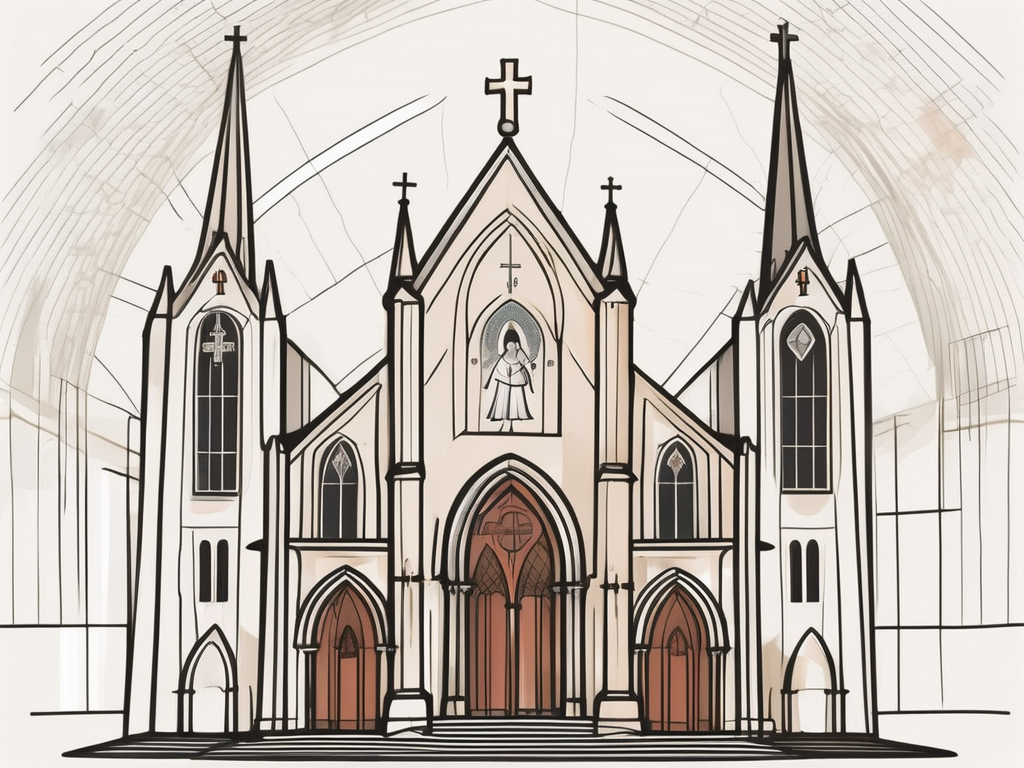In the realm of Christianity, there are various denominations with their own unique traditions, beliefs, and practices. Two such denominations that often spark curiosity and debate are Protestantism and Anglicanism. While they share historical ties and many theological foundations, there are also notable differences that distinguish them. In this article, we will delve into the history, beliefs, practices, and roles of clergy in Protestantism and Anglicanism, providing a comprehensive understanding of their similarities and differences.
Historical Overview of Protestantism and Anglicanism
To fully comprehend Protestantism and Anglicanism, it is essential to explore their historical origins and evolution. Protestantism originated in the 16th century as a movement within Western Christianity, primarily led by Martin Luther, John Calvin, and other reformers. It sought to reform certain practices and beliefs of the Roman Catholic Church.
Protestantism emerged as a response to the perceived corruption and abuses within the Catholic Church during the Renaissance. Martin Luther, a German monk, played a pivotal role in sparking the Protestant Reformation with his Ninety-Five Theses, which criticized the sale of indulgences and other practices. This act of defiance against the Catholic Church marked the beginning of a major religious and cultural shift in Europe.
The Protestant movement quickly gained momentum, spreading across various European countries. John Calvin, a French theologian, further contributed to the development of Protestantism with his theological ideas, particularly the concept of predestination. Calvin’s teachings had a profound impact on the formation of Reformed Protestantism, which became influential in countries such as Switzerland, the Netherlands, and Scotland.
Meanwhile, Anglicanism traces its roots back to the Church of England, which emerged in the 16th century during the reign of King Henry VIII. The English Reformation separated the Church of England from the authority of the Pope in Rome, establishing a distinctive English religious identity.
The English Reformation was primarily driven by political motivations. King Henry VIII sought to annul his marriage to Catherine of Aragon, but the Pope refused to grant him a divorce. Frustrated with the Pope’s refusal, Henry VIII declared himself the Supreme Head of the Church of England, effectively severing ties with Rome and establishing the monarch as the head of the English Church.
Under Henry VIII’s rule, the Church of England maintained many Catholic traditions and practices, while gradually adopting Protestant doctrines. However, it was during the reign of Henry’s son, Edward VI, and the subsequent reign of Queen Elizabeth I that Anglicanism solidified as a distinct religious tradition.
During the reign of Edward VI, the Church of England underwent significant reforms, influenced by Protestant theology. The Book of Common Prayer, introduced in 1549, became a central liturgical text that shaped Anglican worship. Under Elizabeth I, the Church of England adopted a more moderate approach, seeking to accommodate both Protestant and Catholic elements within its practices.
Throughout its history, Anglicanism has been characterized by a broad spectrum of beliefs and practices. It encompasses various theological perspectives, ranging from high church Anglo-Catholicism to low church evangelicalism. This diversity reflects the ongoing tensions and debates within Anglicanism over issues such as liturgy, sacraments, and the role of the church in society.
Today, Protestantism and Anglicanism continue to be influential religious traditions worldwide. They have shaped the religious landscape, influenced social and political developments, and contributed to the rich tapestry of Christian history.
Key Beliefs and Practices
When understanding the differences and similarities between Protestantism and Anglicanism, it is crucial to examine their fundamental beliefs. Protestantism emphasizes the authority of the Bible and the doctrine of salvation by faith alone. This belief in the primacy of scripture stems from the Protestant Reformation, a movement that sought to reform the Catholic Church in the 16th century.
Protestants believe that the Bible is the inspired word of God and the ultimate source of truth. They view it as a guide for faith and practice, and they strive to interpret it in a way that is faithful to its original meaning. This emphasis on scripture alone as the authority for Christian belief and practice sets Protestantism apart from other Christian traditions.
While there is considerable variation within Protestantism, these core tenets unite its diverse branches. Protestants believe that salvation is a gift from God, received through faith in Jesus Christ. They emphasize the importance of a personal relationship with God and the need for individual believers to accept Jesus as their savior.
Anglicanism, on the other hand, maintains a balance between Catholic and Protestant traditions. It values scripture, tradition, and reason as sources of authority. Anglicans believe in salvation through faith, as well as the importance of good works and sacraments.
Anglicans place a strong emphasis on the sacraments, particularly baptism and the Eucharist. They believe that these sacraments are outward signs of God’s grace and that they play a vital role in the spiritual life of the believer. Anglicans also value the tradition of the Church, drawing on the wisdom and practices of the early Christian community.
Furthermore, Anglicanism places a significant emphasis on reason and intellectual engagement. Anglicans believe that faith and reason are not mutually exclusive, but rather, they complement and inform one another. They encourage the use of reason and critical thinking in matters of theology and ethics.
Another important aspect of Anglicanism is its liturgical worship. Anglicans have a rich tradition of liturgy, with a structured and formal approach to worship. They value the beauty and symbolism of worship, seeking to engage all the senses in the worship experience.
In summary, while Protestantism emphasizes the authority of the Bible and salvation by faith alone, Anglicanism maintains a balance between Catholic and Protestant traditions. Anglicans value scripture, tradition, and reason as sources of authority, and they place a strong emphasis on sacraments, reason, and liturgical worship.
Differences in Worship Styles
When it comes to worship, Protestantism and Anglicanism have distinct identities that are shaped by their unique practices. In Protestant churches, worship is often characterized by simplicity and a strong emphasis on preaching and teaching the Word of God. The focal point of the service is the sermon, where the pastor delivers a message that aims to inspire and educate the congregation.
However, worship in Protestant churches is not limited to preaching alone. Music plays a significant role in creating an atmosphere of praise and worship. Contemporary worship songs, with their upbeat melodies and relatable lyrics, are often sung by the congregation. These songs are accompanied by a band or a worship team, consisting of musicians playing various instruments such as guitars, drums, and keyboards. The lively and energetic nature of the music encourages active participation from the worshippers, who often raise their hands and sing with passion.
In addition to contemporary worship songs, hymns also hold a special place in Protestant worship. These hymns, with their rich theological content and timeless melodies, connect worshippers to the long history of the Christian faith. Whether it’s the classic hymns of Charles Wesley or the modern hymns of Keith Getty, these songs serve as a bridge between generations, uniting believers in their shared love for God and their desire to worship Him.
On the other hand, Anglican worship follows a more structured and liturgical tradition. The order of service, known as the liturgy, guides the flow of worship and includes various elements such as prayers, Scripture readings, creeds, and the Eucharist. This structured approach to worship creates a sense of reverence and awe, as worshippers engage in a carefully choreographed sequence of actions and responses.
Anglican worship often begins with a call to worship, followed by the recitation of ancient prayers and the reading of Scripture passages. The congregation participates in responsive readings, where they alternate between speaking and listening, affirming their faith and expressing their devotion to God. The recitation of creeds, such as the Nicene Creed, serves as a declaration of the core beliefs of the Anglican faith, reinforcing the unity of the Church across time and space.
One of the central elements of Anglican worship is the Eucharist, also known as Holy Communion or the Lord’s Supper. During this sacrament, the congregation partakes in the bread and wine, symbolizing the body and blood of Christ. This act of communion not only nourishes the spiritual life of the worshippers but also serves as a reminder of Christ’s sacrifice and the unity of the Church.
Music in Anglican worship is characterized by traditional hymns and choral music. These hymns, often rooted in the rich history of the Anglican tradition, are carefully selected to complement the theme of the service. The majestic sound of an organ fills the sanctuary, accompanied by a choir that leads the congregation in singing hymns of praise and adoration. The harmonies and melodies of these hymns, sung in unison or in parts, create a sense of transcendence and beauty, inviting worshippers to enter into a sacred space.
In conclusion, while both Protestantism and Anglicanism share a common goal of worshiping God, their worship styles differ significantly. Protestant worship emphasizes simplicity, preaching, and contemporary music, fostering an atmosphere of energetic praise. Anglican worship, on the other hand, follows a more structured and liturgical tradition, incorporating prayers, Scripture readings, creeds, and the Eucharist. The use of traditional hymns and choral music in Anglican worship adds a sense of reverence and awe, creating a sacred space for worshippers to encounter the divine presence.
Theological Differences and Similarities
Examining the theological differences and similarities between Protestantism and Anglicanism sheds further light on their distinct perspectives. Protestant theology upholds the belief in the priesthood of all believers, emphasizing individual interpretation of scripture. It places a strong emphasis on personal religious experience and a direct relationship with God.
In Protestantism, the idea of the priesthood of all believers is a fundamental principle that sets it apart from other Christian denominations. This concept highlights the belief that every believer has direct access to God and can interpret the scriptures independently. It empowers individuals to engage with the Bible and develop their own understanding of God’s message. This emphasis on personal interpretation has led to a diverse range of theological perspectives within Protestantism, with various denominations and individuals holding differing beliefs on key theological issues.
Furthermore, Protestant theology places great importance on personal religious experience. It encourages believers to have a direct and intimate relationship with God, seeking spiritual guidance and revelation through prayer, worship, and personal reflection. This emphasis on personal experience often leads to a strong emphasis on emotional and heartfelt expressions of faith, such as charismatic worship and testimonies of personal transformation.
In contrast, Anglican theology balances scripture, tradition, and reason in interpreting and understanding the Christian faith. Anglicans value the consensus of the Church Fathers and the decisions of Ecumenical Councils in shaping their theological principles.
Anglicanism, as a branch of Christianity, draws from both Catholic and Protestant traditions. While Anglicans share some theological similarities with Protestants, they also maintain a connection to the historical traditions of the early Christian Church. Anglicans place a strong emphasis on the importance of tradition, recognizing the wisdom and guidance of the Church Fathers and the Ecumenical Councils in shaping their theological beliefs. They believe that the interpretation of scripture should be informed by the collective wisdom of the Church throughout history.
Additionally, Anglicans value the use of reason in theological inquiry. They believe that faith and reason are not mutually exclusive, but rather complement each other in the pursuit of understanding God’s truth. Anglican theologians often engage in intellectual discourse and critical analysis, seeking to reconcile faith with the knowledge and insights gained from various academic disciplines.
Overall, while both Protestantism and Anglicanism share a commitment to Christian faith, they differ in their approaches to theological interpretation. Protestantism emphasizes individual interpretation and personal religious experience, while Anglicanism seeks a balance between scripture, tradition, and reason. These theological differences contribute to the distinct perspectives and practices within each tradition, shaping the way believers understand and live out their faith.
Role of Clergy and Church Hierarchy
The role of clergy and church hierarchy is an important aspect to consider when comparing Protestantism and Anglicanism. In Protestantism, the clergy has varied roles depending on the denomination. Some denominations have ordained pastors or ministers, while others may have elders or deacons serving in leadership roles. Protestant churches often emphasize the priesthood of all believers, where every member has a direct relationship with God and the ability to minister to others.
Anglicanism, however, maintains a traditional hierarchical structure. At the apex of the hierarchy is the Archbishop of Canterbury, who serves as the spiritual head of the Anglican Communion. The priesthood is vital in Anglicanism, and priests play a central role in administering sacraments and providing pastoral care to their congregations.
By exploring the historical background, key beliefs and practices, worship styles, theological perspectives, and roles of clergy in Protestantism and Anglicanism, a clearer understanding of their differences and similarities emerges. While they may share historical roots and theological foundations, their distinct traditions and practices shape their unique identities within the broader Christian faith. Embracing these diversities fosters a richer appreciation for the breadth and depth of Christian spirituality.












